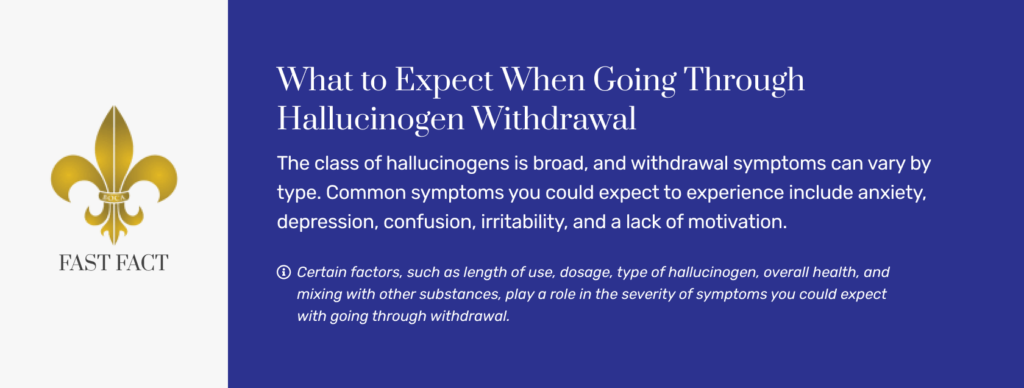Hallucinogens are common drugs that change your perception of the world around you. In 2021, about 2.6 percent of people 12 and older used drugs in this class. Some used the drug only once, but others repeated their doses.
Are you or someone you know struggling with addiction?
I may have a problem I am concerned for a loved oneResearchers aren’t entirely sure how all hallucinogens work. Chemists make new versions in laboratories all the time, and each version has a slightly different action.
Some well-studied hallucinogens (like marijuana) come with a known withdrawal process. But others (like products sold as bath salts) may not.
It’s never safe to use hallucinogens, and it’s even more dangerous to take them often. Below, we’ve outlined what you need to know about what a hallucinogen withdrawal process might look like.
What Happens During Hallucinogen Withdrawal?
Researchers don’t believe that all hallucinogens are addictive in the classic sense. Some cause severe side effects (like nausea) that keep people from repeating their doses. But some types of hallucinogens can cause persistent brain changes.
When drugs alter brain chemistry, cells can malfunction during sobriety. They are accustomed to the constant presence of drugs, and they need time to adjust to working without it.
Withdrawal involves allowing brain cells to return to their natural state without the influence of hallucinogenic drugs. If these symptoms are disrupting daily life, our Florida drug rehab provides structured care to stabilize withdrawal and support early recovery. Since no prescription medications can mimic hallucinogens and provide withdrawal relief, most people just need time to feel better.

Understand Your Hallucinogen Withdrawal Symptoms
The hallucinogen class is large, and it includes several disparate drugs. Each one works a little differently, and they can also cause slightly different reactions when you stop taking them.
Typical hallucinogen withdrawal symptoms include the following:
- Anxiety
- Depression
- Confusion
- Irritability
- Lack of motivation
You may also experience deep cravings for drugs, and they can cause you to relapse.
Factors that can change the severity of your symptoms include the following:
- Length of use: The longer you’ve used hallucinogens, the more damage has been done to your brain and body. Your withdrawal process may be more complicated as a result.
- Dose: Bigger drug amounts do more damage than smaller doses.
- Health: Your organs process drugs, and if they’re not functioning properly, they may need more time to do their work.
- Other drugs: If you’ve added substances like opioids or benzodiazepines to your hallucinogens, your symptoms may be more severe. The withdrawal timeline may also be much longer.
Some people have difficult symptoms that are caused by drugs, but they aren’t technically withdrawal symptoms. Researchers say some people develop persistent hallucinations and other unusual mental health symptoms. This issue can arise after just one exposure to hallucinogens.
Flashbacks aren’t part of the hallucinogen withdrawal process, but they are haunting symptoms caused by drug use.

Hallucinogen Withdrawal Timeline
While all hallucinogens are different, using one specific drug can help you understand what a typical withdrawal process looks like. Marijuana, which is typically classified as a hallucinogen, is our example.
A typical marijuana withdrawal timeline looks like this:
- Day 1: Symptoms begin, usually at the 24-hour mark.
- Day 2: Symptom severity strengthens.
- Day 6: Symptom severity peaks.
- Day 7: Symptoms begin to weaken.
Some people feel sick for three weeks as their bodies recover, but some people can recover a little quicker.
How to Detox From Hallucinogens Safely
No prescription medications are designed to help people recover from hallucinogen abuse. But your doctor should still be part of your recovery plan.
A doctor can assess your physical and mental health and ensure you are healthy enough to move through this process quickly. Your doctor can also address addictions to other drugs that are complicating your recovery.
Get Help for Addiction to Hallucinogens
A specialized treatment facility is the safest place for your hallucinogen recovery. At our Indiana addiction treatment center, you’ll receive individualized support to manage withdrawal and rebuild long-term stability. Providers here understand all of the hallucinogen types, and they can assist with plans to help you live a healthier life.
Contact us to find out how treatment works and how you can get started. With the right help, you can get on a path that leads to a future without substance abuse.
- Psychedelic and Dissociative Drugs. (April 2023). National Institute on Drug Abuse.
- Clinical Management of Cannabis Withdrawal. (July 2022). Addiction.
- Hallucinogen Persisting Perception Disorder: Etiology, Clinical Features, and Therapeutic Perspective. (February 2018). Brain Sciences.
- Clinical Applications of Hallucinogens: A Review. (August 2017). Experimental and Clinical Psychopharmacology.
- Persisting Reductions in Cannabis, Opioid, and Stimulant Misuse After Naturalistic Psychedelic Use: An Online Survey. (January 2020). Frontiers in Psychiatry.
















